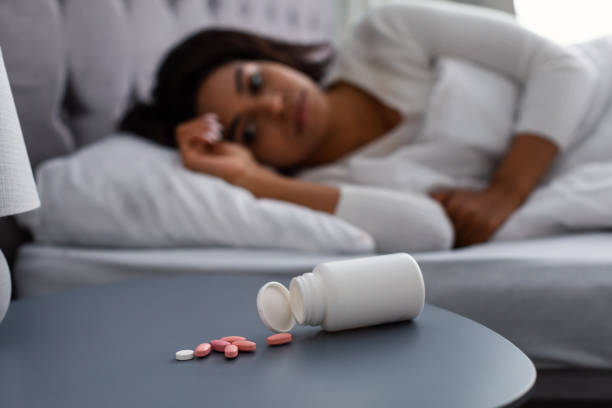
When trying to get a good night's rest there are many reasons why that may not come easy to some people. Whether it be the stresses of the day lingering into your downtime at night or suffering from insomnia, sometimes getting a solid few hours of sleep at night is harder than a trigonometry question. That’s why many people resort to some sort of help when trying to get some sleep. A nice warm bath or a hot shower, a warm cup of chamomile tea, and a few drops of essential oil in a diffuser. Putting on soothing sounds from youtube such as ASMR videos or hours of rainfall content are all ways that might help you achieve that restful state that’s needed daily. Though when that doesn’t work either, some people resort to over-the-counter medication such as melatonin, which has definitely proven that it can be of assistance when trying to get a decent amount of rest every night. But as with all things in this world, there are some downsides to this remedy, so you must ask yourself this question: does melatonin really help or is it making things worse?
What Does Melatonin Do?
Melatonin is a type of hormone in the body that everyone has to help them with their sleep and wake-up cycle (being able to go to bed naturally and then wake up naturally).
Though the natural hormone itself doesn’t make you go to sleep, it does put you in a quieter and more calming state that promotes and makes it easier to fall asleep.
Usually, you have higher levels of melatonin hormones in your bloodstream at night. For those who struggle with sleeping at night or in general, that means their own melatonin hormone levels are low so they need help with going to sleep. This is where melatonin supplements come into play.
How Does This Help You?
Melatonin supplements are a form of over-the-counter sleep medication that can help with your sleeping troubles. If you suffer from sleeping disorders, have jet lag or delayed sleep phases, then melatonin supplements might be a good option for you.
Pharmacy found melatonin is only for short-term use. You can use it to fall asleep early if you are someone who usually stays up until the wee hours of the morning, but has something important to do and requires you to be up early in the morning.
Usually, these supplements come with fewer downsides such as dependency or a hangover effect. This makes it easier to use because you don’t have to worry about future risks and complications.
It’s also more ideal because these supplements don’t cause habituation, which is when your body gets accustomed to something and it no longer works for you. Simply put, melatonin is good for simple usage.
How Does This Affect You?
Now with all good things, come side effects and sometimes that may be the real answer to if something is actually working or making matters worse. Though melatonin doesn’t have the dependency or downsides as other sleep medications, they do come with side effects and these side effects can actually make using it not worth it.
The most common side effects of melatonin supplements are nausea, dizziness, drowsiness, and headaches. Melatonin has the ability to cause headaches and migraines because of a few different reasons. The first one (and which may be ironic) is that melatonin disrupts your sleeping cycle, which can cause headaches. This is because changing your natural sleep-wake cycle causes headaches.
Another reason why using melatonin supplements can cause headaches is because there is no regulation on what is actually in the product. Since melatonin supplements are considered a dietary supplement, they have fewer restrictions on what’s actually in the product when it comes to the FDA. Potentially you could be taking a melatonin supplement with low melatonin levels that probably won’t really help you. Or you could be taking melatonin supplements that have a mixture of different supplements in them on top of the melatonin. It all depends on the brand and the label but even the label may not tell you what’s actually in the product that you’re taking. This could all lead to bad headaches and migraines.
RELATED: Melatonin Overdoses Are Up 530% in Kids, Here’s What You Need to Know
Natural Remedies For A Better Sleep
If you are someone who uses melatonin but notice more problems than solutions, you should know that there are natural remedies out there to help.
As mentioned earlier, drinking warm tea before bed, and taking a soothing and warm shower or bath while adding essential oils or eucalyptus can help induce your natural melatonin levels and cause a faster wind down for the night.
Using a diffuser with essential oils that help promote sleep (eucalyptus) can also be helpful.
Exercising as well as turning all the lights off and making the room dark before you go to bed can also help you achieve a better sleep faster.
However you choose to go about sleeping better at night, just make sure it doesn't do more harm than good.








